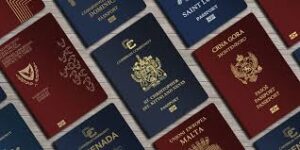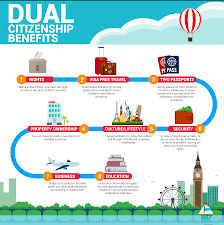Dual citizenship for individuals and families
The idea of dual citizenship, or the ability to hold two citizenships at the same time, has become increasingly popular over the years. While it was once a rarity, it has now become a more common occurrence, with millions of people around the world holding dual citizenship. In this article, we will explore the benefits of dual citizenship for individuals and families.
Firstly
Dual citizenship can provide individuals with greater freedom and flexibility. Holding dual citizenship allows individuals to travel and work freely in two countries without any restrictions. This is particularly beneficial for those who have family or business ties in both countries, as they are able to move back and forth between the two without having to worry about visa restrictions or the need to obtain work permits. Additionally, dual citizenship can also provide individuals with access to certain benefits and privileges in both countries, such as the ability to vote or run for office.
Secondly
Dual citizenship can also provide individuals with greater economic opportunities. For example, individuals who hold dual citizenship can take advantage of different tax systems in both countries, allowing them to minimize their tax liability and maximize their financial returns. Additionally, dual citizenship can also provide individuals with access to different social security benefits and retirement programs, allowing them to build a more secure financial future for themselves and their families.
Thirdly,
Dual citizenship can also provide individuals with greater cultural and personal enrichment. By holding dual citizenship, individuals are able to fully embrace both cultures and traditions, and gain a deeper understanding of their heritage and ancestry. This can be particularly beneficial for individuals who have immigrated to a new country, as it allows them to maintain a connection with their home country and culture, while also fully embracing their new country and culture. Additionally, holding dual citizenship can also provide individuals with greater language skills and proficiency, as they are exposed to multiple languages and are able to fully immerse themselves in both cultures.

In addition to the benefits for individuals
Dual citizenship can also be highly beneficial for families. Firstly, it can provide families with greater security and stability. By holding dual citizenship, families are able to have a foothold in two different countries, providing them with a safety net in the event of political instability, economic turmoil or other unforeseen circumstances. Additionally, dual citizenship can also provide families with greater access to education and healthcare services in both countries, ensuring that their children receive the best possible education and medical care.
Secondly
dual citizenship can also provide families with greater opportunities for reunification. For example, if a family member is living in a different country, holding dual citizenship can make it easier for them to join their family and settle in their new home country. Additionally, holding dual citizenship can also make it easier for families to travel and stay connected with their extended family members who may live in different countries.
Thirdly
Dual citizenship can also provide families with greater opportunities for business and investment. For example, if a family member owns a business in one country, holding dual citizenship can allow them to expand their business operations into another country without having to worry about visa restrictions or the need to obtain work permits. Additionally, holding dual citizenship can also provide families with greater investment opportunities, allowing them to take advantage of different economic and business environments in both countries.
It is important to note that while there are many benefits to holding dual citizenship, there are also some potential drawbacks that individuals and families should be aware of. For example, dual citizenship can sometimes create conflicts of interest or loyalty, particularly in the event of political or military conflict between the two countries. Additionally, holding dual citizenship can also create certain tax and legal obligations in both countries, which can be complex and difficult to navigate.
The benefits of dual citizenship for individuals and families are many and varied. From greater freedom and flexibility to increased economic opportunities and personal enrichment, holding dual citizenship can provide individuals
and families with a range of benefits that can enhance their lives in numerous ways. It can also provide families with greater security, reunification opportunities, and business and investment opportunities. However, it is important to weigh the potential drawbacks and complexities of holding dual citizenship before making the decision to pursue it.

In order to obtain dual citizenship
The requirements vary from country to country. Some countries allow for automatic dual citizenship, while others require individuals to go through a lengthy and often complex application process. It is important for individuals and families to research the specific requirements for their chosen countries and seek guidance from immigration lawyers or other experts to navigate the process successfully.
Overall, dual citizenship can provide individuals and families with numerous benefits, including greater freedom and flexibility, economic opportunities, cultural and personal enrichment, security, reunification, and business and investment opportunities. While there may be some potential drawbacks and complexities to consider, the benefits can far outweigh these challenges for those who are willing to put in the effort to obtain and maintain dual citizenship.
Additionally, dual citizenship can also provide individuals and families with a sense of belonging and connection to both their home country and their new country. It allows them to fully embrace and appreciate both cultures and traditions, which can lead to a greater sense of identity and personal fulfilment. This can be particularly important for individuals and families who have had to leave their home country and adapt to a new culture and way of life.
Furthermore, holding dual citizenship can also provide individuals and families with greater opportunities for education and career advancement. For example, individuals with dual citizenship may have access to more scholarship opportunities or be able to pursue higher education in different countries. They may also be able to take advantage of different career opportunities in both countries, which can lead to greater job satisfaction and financial success.
In terms of international travel, holding dual citizenship can also make it easier for individuals and families to travel to different countries. For example, if one country has visa restrictions or travel bans in place, individuals with dual citizenship may be able to use their other passport to travel freely. This can be particularly beneficial for those who frequently travel for work or have family members living in different countries.
In conclusion
The benefits of dual citizenship for individuals and families are numerous and can have a significant impact on their lives. From greater freedom and flexibility to increased economic opportunities and personal enrichment, dual citizenship can provide individuals and families with a range of benefits that can enhance their lives in numerous ways. While there may be some potential challenges to consider, the benefits can far outweigh these challenges for those who are willing to pursue and maintain dual citizenship.





